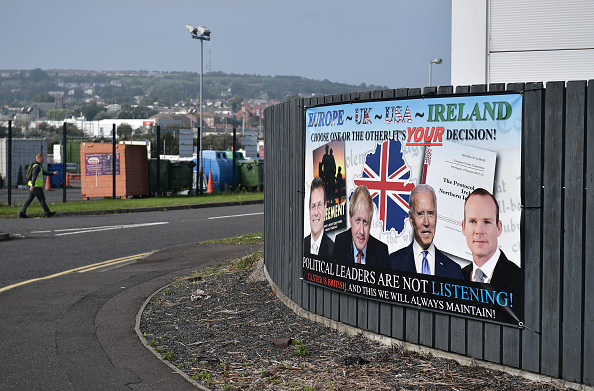A Northern Irish compromise is a balancing act of conflicts

The Northern Ireland Protocol, the compromise Boris Johnson signed in October 2019 in order to secure Brexit, was – and remains – a running sore first for the Conservative party and now for the Unionist parties in Northern Ireland.
The Protocol has effectively created a border down the Irish Sea, with goods moving from mainland Britain subject to customs and regulatory checks. Only 18 months prior to the agreement, Theresa May had said no UK prime minister could ever agree to such an arrangement which threatened the “constitutional integrity of the UK”. Johnson did just that.
He also agreed to a unique arrangement on governance and remedies. Because Northern Ireland remained in the EU’s Customs Union and single market for goods, this has two consequences for the next Prime Minister, which Liz Truss and Rishi Sunak will be attempting to reconcile at Conservative Party hustings in Belfast tonight.
First, there is what’s known as “dynamic alignment”, which means Northern Ireland is subject to EU rules in particular areas, with no say over their creation. Second, the European Commission and the Court of Justice continue to have the same role in Northern Ireland as when the UK was a member state of the EU.
To an outsider these arrangements do look odd. Brexit, after all, meant Brexit. Yet they were introduced to preserve peace on the island of Ireland, specifically the Belfast Good Friday Agreement 1998 which, in effect, precludes a border between the North and South of Ireland. But without this, there necessarily had to be a border somewhere else, lest the UK stay tied to the EU’s single market and customs union. And since Northern Ireland, uniquely, benefited from being in the EU’s customs union, EU rules about enforcement applied.
Legally this all sounds sensible. But the politics is another battle. The Democratic Unionist party fared less well in the May elections than they hoped. Sinn Fein became the largest party, with the right to nominate the First Minister. The DUP, as the largest unionist party, had to nominate a deputy first minister for the executive to be formed; it refused to do so until issues over the Protocol had been resolved.
This led to the publication of the Northern Ireland Protocol Bill sponsored by Liz Truss as Foreign Secretary. This Bill effectively turns off large parts of the Protocol, in particular the provisions keeping Northern Ireland in the Customs Union, dynamic alignment, and the role for the Commission and the ECJ. The outgoing prime minister called these little more than a “trivial set of adjustments”; most lawyers disagreed and considered the Bill a breach of the UK’s obligations under international law. The government justified the Bill on the grounds of necessity under international law, an argument largely dismissed by the legal community.
Nevertheless, the legislation passed through the House of Commons. Meanwhile the European Commission has started enforcement proceedings against the UK for not complying with specific provisions of the Protocol (though not the proposed new laws).
Navigating a way through this poses serious issues. Will they respond to the Commission’s current legal action or ignore it? Will they carry on pushing the new legislation through parliament and wait for a potentially serious retaliation from the EU, possibly leading to a trade war, not to mention hostile reaction from the US?
Or will they back down and face serious hostility from the DUP and a non-functioning executive in Northern Ireland, creating further instability in Northern Ireland. None of the options are palatable. Finding technical fixes to some of the problems would help but that is not on the table.
The post A Northern Irish compromise is a balancing act of conflicts appeared first on CityAM.
For all the latest Lifestyle News Click Here
For the latest news and updates, follow us on Google News.

